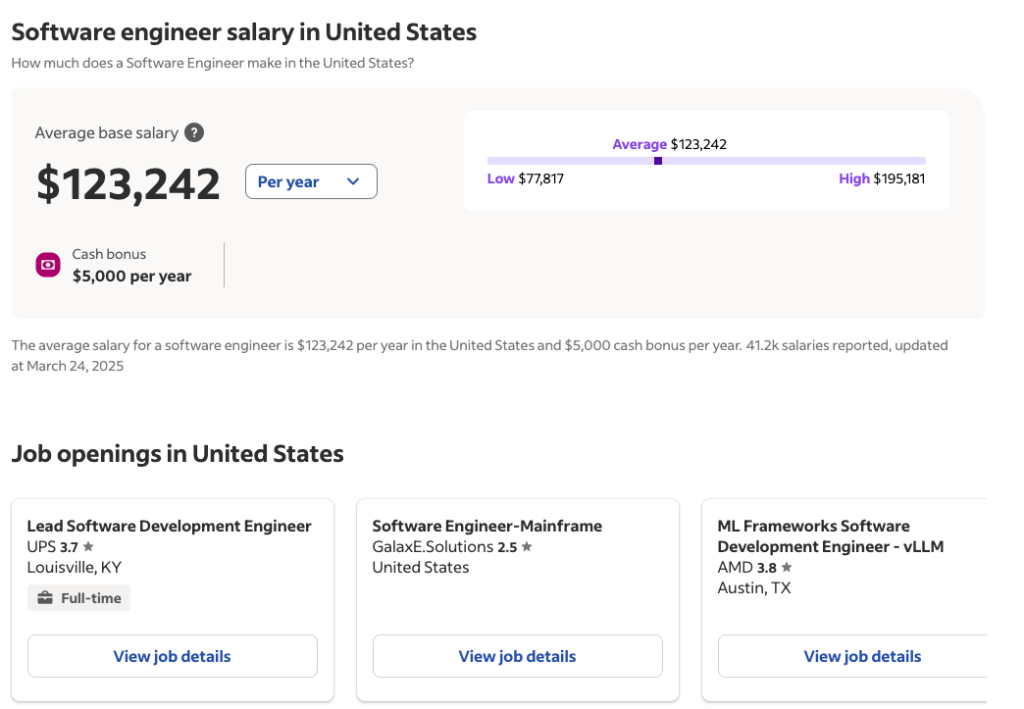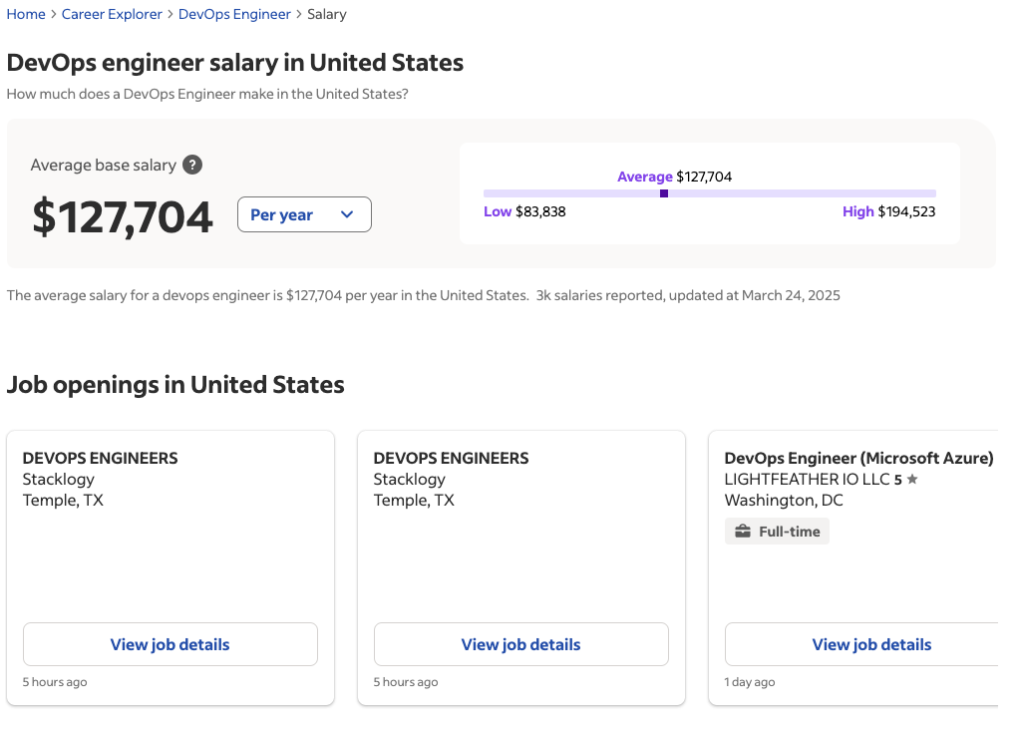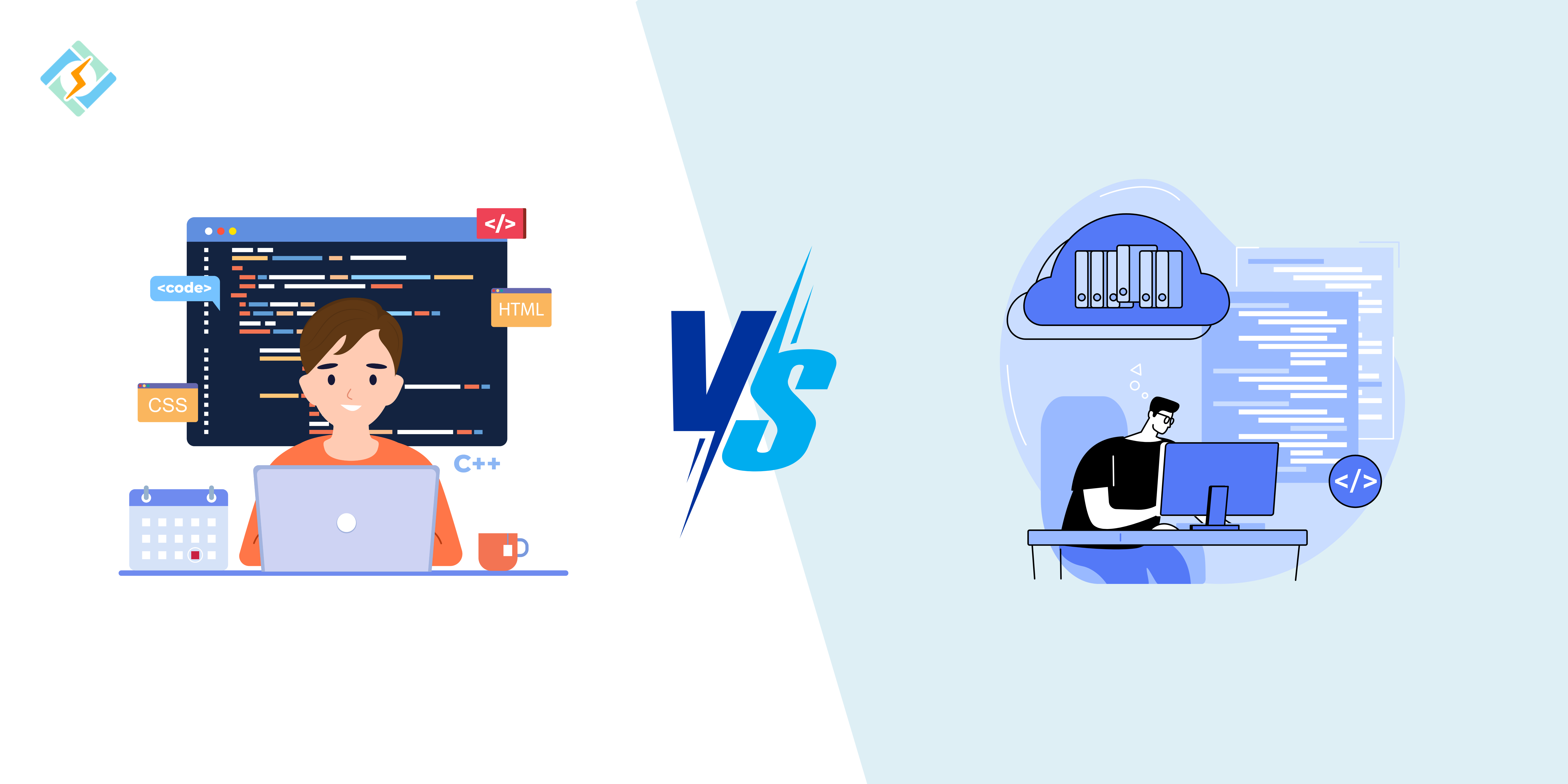DevOps vs Software Engineer-Two of the hottest fields in tech today! If you’re into tech, I’m sure you’ve heard about both, considered one as a career option, but still skeptical!
Both are essential but they offer very different career experiences.
Simply put, DevOps engineer vs software engineer are there to ensure software runs smoothly in real-world environments so focus on automating workflows, while software engineers are the architects who design and build applications using various programming languages and tools. They prioritize software security and scalability, whereas DevOps engineers improve the processes of integration, testing, deployment, and monitoring.
Today we learn where a DevOps vs Software engineer really differs, job roles, and which one is right for you.
What Is a DevOps Engineer?
A DevOps engineer is a versatile IT professional with a broad understanding of both development and operations. This includes skills in coding, infrastructure management, system administration, and various DevOps tools. They also need good interpersonal skills to foster collaboration across different departments within the company.
DevOps engineers are responsible for designing, implementing, and maintaining CI/CD pipelines, managing infrastructure, monitoring system performance, configuring servers, resolving issues, and establishing best practices. They must have excellent communication abilities and be well-versed in DevOps tools and technologies such as Git, Jenkins, Ansible, Docker, Kubernetes, and cloud services. Additionally, they focus on creating and executing cloud strategies, choosing the right DevOps tools, managing cloud deployments, ensuring security, and facilitating scalability.
Get exclusive access to all things tech-savvy, and be the first to receive
the latest updates directly in your inbox.
Role and Responsibilities Of A DevOps Engineer
The responsibilities of a DevOps engineer may include:
- Overseeing all stages of the Software Development Lifecycle (SDLC)
- Managing software automation processes and operating automation tools
- Preparing documentation for server-side features to enhance long-term system maintenance
- Supporting the implementation of continuous integration and continuous deployment in the development workflow
- Conducting performance evaluations to monitor the team’s progress and pinpoint areas for enhancement
- Organizing continuous testing at different phases of development to quickly address software issues
- Establishing continuous feedback loops among development teams, IT operations, and end users for effective communication
- Promoting DevOps culture and practices within the organization
- Collaborating with software developers, engineers, and other IT professionals to ensure a smooth development process
What is Software Engineering?
Software engineers are the innovative thinkers who develop the applications, websites, and software we rely on daily. Professionals who use engineering principles and programming knowledge to create a variety of software applications.
To bring their ideas to life, they work closely with teams to understand user requirements, design software solutions, and write and test code to ensure it functions correctly. Their daily responsibilities can range from adding new features to resolving issues, and they continuously update their skills with the latest technologies. Whether creating a mobile app, a sophisticated enterprise system, or a website, software engineers shape our digital landscape.
‘Software engineering is the organized approach to planning, developing, testing, and maintaining software systems. It has progressed from a chaotic process in its early stages to a well-defined discipline with recognized methods and best practices.’
Nowadays, software engineering is crucial for building dependable and scalable software that supports our contemporary world, ranging from basic mobile applications to intricate enterprise systems. Software engineers operate in various sectors, utilizing their technical expertise and creativity to tackle challenges and create innovative solutions that enhance our lives and businesses.
The tech industry heavily relies on software engineers, who are responsible for creating and maintaining the software that powers our daily activities. Their job is diverse, involving a mix of technical skills and teamwork.
Skills and Requirements for DevOps Engineer
- Technical Proficiency: Understanding with programming languages including Python, Ruby, and Java.
- Tool and Platform Expertise: Experience with Docker, Jenkins, Kubernetes, and Ansible.
- Systems Administration: Knowledge of system administration in Linux/Unix and Windows environments.
- Interpersonal Skills: Strong problem-solving skills, a collaborative approach, and effective communication abilities.
- Problem-solving: Ability to quickly identify and fix issues in daily operations.
- Communication: Strong verbal and written skills for effective teamwork are indispensable.
- Process-focused: Accentuates processes and procedures over just outcomes and reasons.
- Documentation: It is important to document processes clearly for effective knowledge sharing.
- Agile experience: Familiarity with Agile software development practices is advantageous.
- Project management: Experience in leading development initiatives and managing timelines.
- Education: A bachelor’s or master’s degree in Computer Science, Engineering, Software Engineering, or a related field is required.
- IT best practices: Understanding of IT best practices for maintaining continuous service availability.
- Deployment/configuration management: Experience with tools like Git, Jira, GitLab, or Jenkins for configuration management.
DevOps Engineer Requirements and Education
- A bachelor’s degree in Computer Science, Information Technology, Software Engineering, or a similar discipline.
- Relevant professional certifications in tools such as Jenkins, Docker, and Kubernetes.
- Hands-on experience obtained through internships or entry-level roles.
- Preference for specialized training courses from third-party providers.
Role and Responsibilities Of A Software Engineer
Software engineers fall into two primary groups:
Application engineers: They assess client requirements and facilitate the development of programs.
System engineers: They design, maintain, and enhance computer systems while managing IT services within an organization.

Development
- Writes and tests code to fulfill project specifications.
- Develops software solutions tailored to stakeholder requirements.
- Works alongside designers, product managers, and quality assurance teams.
- Engages in code reviews and design discussions.
Maintenance
- Debugs and resolves software issues to ensure optimal performance.
- Implements updates and enhancements to adapt to changing user needs and technological progress.
- Produces technical documentation outlining the program’s functionality, design decisions, and code.
- Monitors software development processes to maintain traceability.
Skills and Requirements for Software Engineers
Technical Proficiency:
- Knowledge of programming languages such as Ruby, JavaScript, C++, C#, Python, and Java.
- Familiarity with software development approaches such as Scrum or Agile.
- Experience with databases and API’s.
- Understanding of cloud computing and security.
Soft skills:
- Effective communication, teamwork, and problem-solving abilities.
- The capacity to think critically, evaluate issues, and come up with original solutions.
- Education and experience with necessary degrees and certificates.
- Previous portfolio projects and work experience.
Software Engineers Qualification Requirements
- Experience as a technical lead.
- Knowledge of developing services and APIs with a range of technologies.
- Having experience in automation tools such as Jenkins, Maven, and Apache Ant.
- Information about legal work prospects, employment conditions, application criteria, and perks.
- Permission for flextime or remote work.
Key Differences Between A DevOps vs Software Engineer
Here’s a comparison table of the areas a DevOps engineer vs software engineer are different.
| Area/ Aspect | DevOps Engineer | Software Engineer |
| Focus | Connect development and operations for seamless delivery. | Create, develop, and sustain software applications. |
| Key Skills | Automation, cloud services, CI/CD, infrastructure management. | Coding, software architecture, algorithms, data organization. |
| Responsibilities | Automate deployment processes, oversee system monitoring and ensure scalability. | Write code, troubleshoot problems, enhance performance, and design systems |
| Work Environment | Mainly part of development teams, concentrating on coding tasks. | Collaborates with both development and operations teams. |
| Toolset | Jenkins, Kubernetes, Docker, Terraform, and cloud services. | Integrated Development Environments (IDEs), version control systems, debugging tools, and databases. |
| Deployment Responsibility | Manages deployment pipelines and ensures system reliability. | Mainly focused on the application itself. |
| Lifecycle Involvement | Participates throughout the entire lifecycle, from development to deployment. | Primarily engaged during the development stage. |
| Skills in Programming | Familiarity with scripting languages such as Python and Bash, with less focus on application coding. | Strong expertise in programming languages like Java, C++, and Python. |
| Collaboration & Team Involvement | Engages with both developers and IT/operations teams, or cybersecurity experts. | Works closely with designers, product managers, and other developers. |
Now, let’s dig a little deeper into the details and see more about DevOps engineer vs software engineer differences:
Software and DevOps Engineering Duties
Main Duties
- Software engineers develop new applications, design and evaluate systems, create documentation, and implement changes.
- DevOps vs software engineers focus on automating the development workflow, ensuring security and compliance, and safeguarding system integrity.
Emphasis
- Software engineers concentrate on the development aspect, crafting and constructing software, coding algorithms, and testing before launch.
- DevOps engineers adopt a business-oriented and user experience approach, striving to fulfill user requirements for software releases while ensuring optimal performance.
- They manage all phases of the Software Development Life Cycle (SDLC), enhancing efficiency and speed while reducing the impact on current systems.
Speed
- Software engineers adhere to a conventional SDLC framework, which can lead to delayed feedback during development.
- DevOps enhances the feedback loop, facilitating quicker issue resolution and deployment.
Experience
- Software engineers typically have a more specialized focus and may find it easier to secure jobs due to a higher number of available positions.
- DevOps roles often demand a broader skill set and usually require 3-4 years of experience.
Skills & Expertise
- Software engineers need to be knowledgeable in databases, data structures, algorithms, debugging, troubleshooting software problems, and familiar with various programming languages and databases.
- DevOps engineer vs software engineer should blend software engineering skills with abilities in communication, teamwork, configuration and management of SQL and NoSQL databases, automation of development tasks, understanding of cloud services, Agile methodologies, and familiarity with DevOps tools like Docker, Ansible, and Buddy, as well as knowledge of infrastructure platforms.
DevOps Engineer Salary vs Software Engineer
A DevOps vs software engineer has greater responsibilities, which usually leads to higher salaries compared to software engineers. On average, DevOps engineers earn $127,704 annually, along with cash bonuses averaging $6,863 each year. In comparison, software engineers typically make around $101,567 per year, but they usually earn less than $100,000 during their first two years in the field.
Average DevOps engineer salary vs software engineer according to Indeed
Software Engineers: $90,000 – $150,000 per year (varies based on experience and location).

DevOps Engineers: $100,000 – $160,000 per year (often slightly higher due to their specialized skills).

Also, Glassdoor reports that the typical salary for a DevOps engineer in the U.S. is approximately $115,000 annually, whereas a software engineer makes about $105,000 on average. This trend shows that DevOps professionals tend to earn more than those in software engineering.
DevOps vs software engineer typically earn about 30% more than software engineers, with salaries in Europe ranging from €54,737 to €97,002. In Germany, the average annual salary for a DevOps engineer is approximately €78,092, which translates to about €38 per hour.
Final Thoughts- Which Career Is Right for You?
When it comes to DevOps vs software engineer and choose what excites you the most and aligns with your skills and passions. This article explained the skill sets each requires, salary prospects, and areas they benefit.
If you enjoy coding, logic, software design, go for software engineering. Many software engineers transition to DevOps after gaining experience in scripting, cloud computing, and automation. Both fields present great opportunities, competitive pay, and engaging challenges, making them resilient career choices in technology.
If you’re more into automation, cloud infrastructure, and system management- Pick DevOps! It offers less flexibility due to the requirement for manual infrastructure tasks but comes with attractive salary benefits. In contrast, Software Engineering provides more flexibility, allowing for remote work and freelance opportunities.
DevOps provides many opportunities for individuals skilled in deployment automation, quality assurance, testing automation, and version control, and the field is anticipated to continue evolving and expanding.
FAQ’s
1. How are the roles of a DevOps vs Software Engineer different?
Software Engineers focus on designing and developing applications, while DevOps Engineers handle deployment automation and manage infrastructure.
2. Which job is better, DevOps engineer vs Software Engineer?
If you love coding, go for Software Engineering. If you’re more into automation and cloud infrastructure, then DevOps might be the way to go.
3. Do DevOps Engineers earn more than Software Engineers?
Yes, typically, DevOps vs Software engineer earn higher salaries as they have expertise in automation, cloud technologies, and system management.
4. Can a Software Engineer transition to a DevOps role?
Absolutely! It’s quite possible to learn automation tools, cloud computing, and CI/CD pipelines.
5. Is DevOps more challenging than Software Engineering?
DevOps covers a broader range of topics, including coding, cloud services, and automation, making it complex but also very rewarding.



